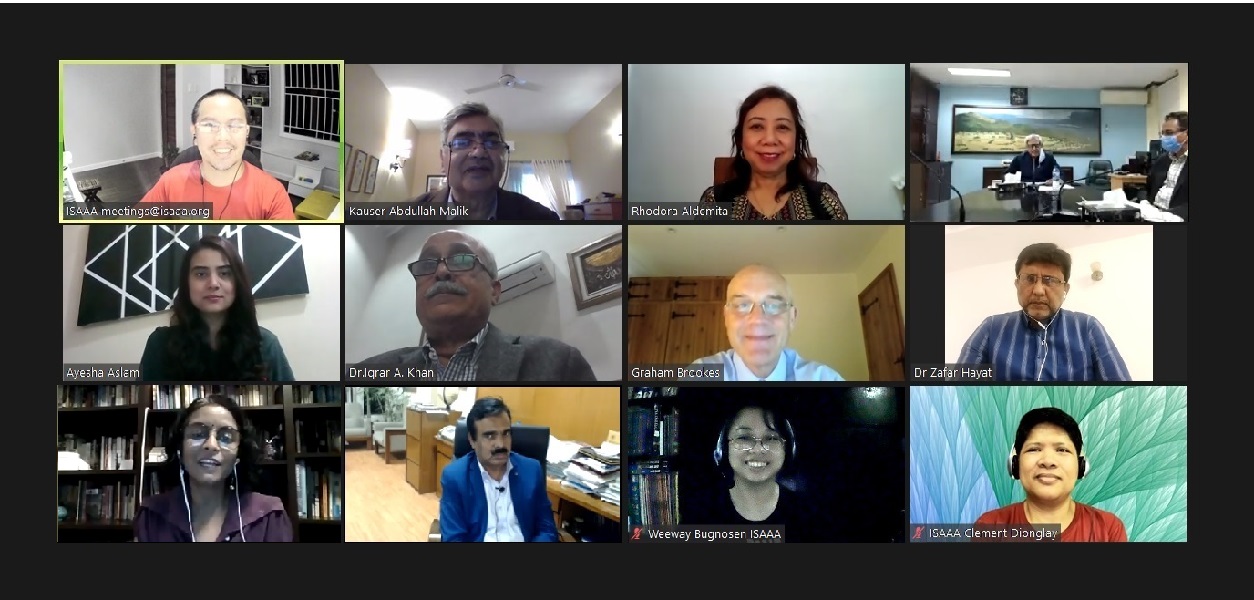
Pakistan's Agriculture Industry Remains Open for Biotech Opportunities
November 18, 2020| |
Economist Graham Brookes of P.G. Economics Ltd. continues his online country reports to provide the latest data on the economic and environmental benefits of genetically modified (GM) crops. His latest episode was hosted by Pakistan, with Federal Minister Syed-Fakhar Imam of the Ministry of Food Security and Research in attendance.
Brookes first gave his 23-year global report about the economic and environmental impacts of GM crops, stating that the total farm income gain from GM crops from 1996 to 2018 amounts to US$ 225 billion. He also reported that the use of pesticides has gone down by 776 million kg since 1996, and that 23 billion kg of greenhouse gas emissions were not released into the atmosphere as a result of planting GM crops. Dr. Rhodora R. Aldemita, Director of the ISAAA SEAsiaCenter, also reported on the global status of biotech crops and highlighted that Pakistan has always been in the top ten countries of GM crop producers during the last few years. Director Kauser Abdulla Malik of the Pakistan Biotech Information Center in Lahore gave an update on the current status of agri-biotech in Pakistan followed by a report on biotech crop adoption and acceptance in Pakistan by Dr. Shahid Mansoor of the National Institute for Biotechnology and Genetic Engineering, who emphasized that Pakistan needs new technologies like NBTs because the country's genetic gain rate is slow and NBTs can offer transgene-free genetic gain.
Dr. Zafar Hayat, a medical doctor and the president of the Farmers Bureau of Pakistan, presented from a stakeholder's point of view. He reported that while GM cotton performed very well when it was introduced in the 1990s, it is now time for new and better technologies to be introduced in Pakistan so that farmers of today can have the same benefits as the farmers from 20 years ago who planted GM cotton. He also mentioned that myths about the GM technology that are not backed by science also affected the confidence of the farmers towards GM crops. Federal Minister Syed-Fakhar Imam echoed the views of the previous speakers and stated that biosafety regulations in Pakistan need to evolve and be updated in order to support the farmers who would like to receive new technologies that can help them. He also called for the promotion of science-based facts and evidence to guide regulators, developers, and beneficiaries alike in exploring the opportunities that GM crops can bring to Pakistan. Dr. Mahaletchumy Arujanan, the Global Coordinator of ISAAA, closed the webinar with another appeal to GM critics to speak to the farmers first before speaking for them.
The full episode can be viewed on the ISAAA YouTube channel.
| |
You might also like:
- Indian Farmer Confirms Socio-economic Impact of Bt Cotton
- Thai Farmer Highlights Role of Biotech in Changing the Course of Agriculture
- GM Crops' Impact Creates a Halo Effect, Expert Explains
Biotech Updates is a weekly newsletter of ISAAA, a not-for-profit organization. It is distributed for free to over 22,000 subscribers worldwide to inform them about the key developments in biosciences, especially in biotechnology. Your support will help us in our mission to feed the world with knowledge. You can help by donating as little as $10.
-
See more articles:
-
News from Around the World
- International Rescue Brings Syria's Seed Collection Back to Svalbard
- OFAB-Kenya Celebrates Media's Contribution to Promoting Agri-biotech
- Extra Gene Pairs and Biological Clock Control Important Plant Functions
- Texas AgriLife Makes Breakthrough in Fight Against Plant Diseases
- Honduran Farmers Attest to GM Maize Benefits
- Bansal Leads Initiative to Evaluate ~22,000 Wheat Accessions
- Australian OGTR Invites Public Comments on GM Clover Field Trial
- Pakistan's Agriculture Industry Remains Open for Biotech Opportunities
- Virtual Tech Forum to Tackle Environmental Impact of GM Crops
-
Research Highlights
- More Clues on the Mystery of Fast-evolving Genes Found in ‘Junk DNA'
-
Plant
- Report Forecasts Healthy Growth for Gene Editing Market
-
Health
- Chemists Discover Structure of Key SARS-CoV-2 Protein
-
Read the latest: - Biotech Updates (April 24, 2024)
- Gene Editing Supplement (April 24, 2024)
- Gene Drive Supplement (February 22, 2023)
-
Subscribe to BU: - Share
- Tweet

